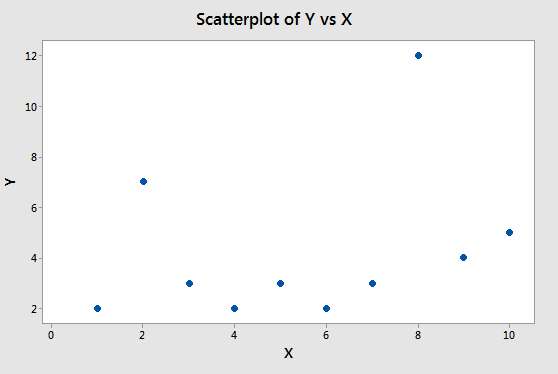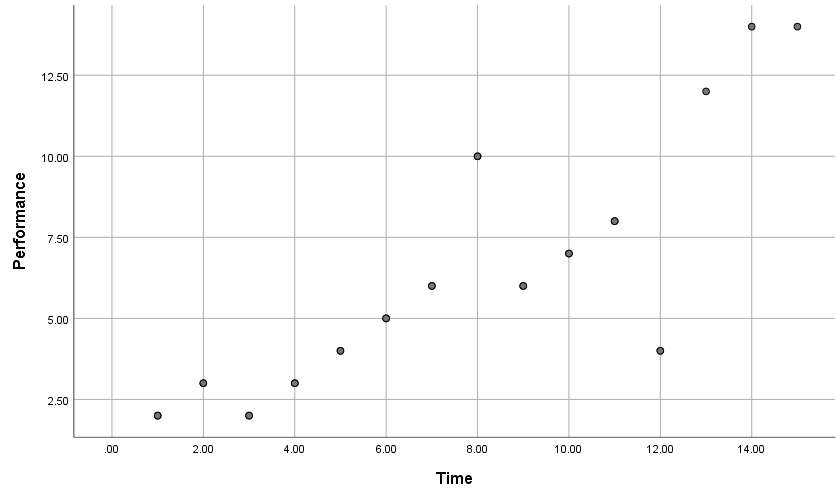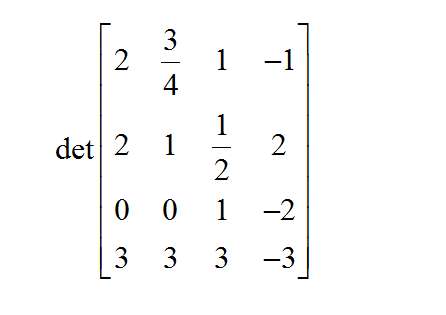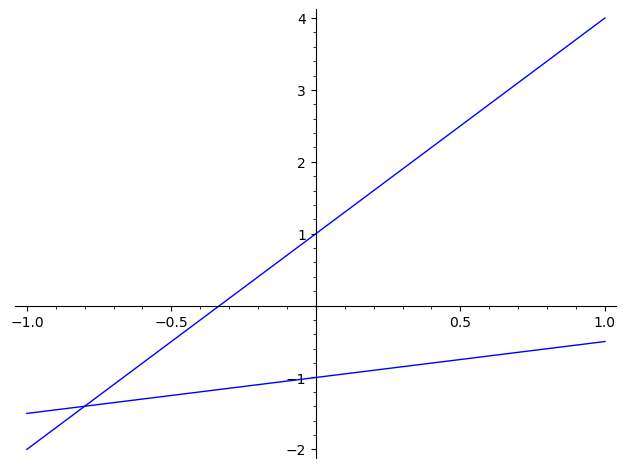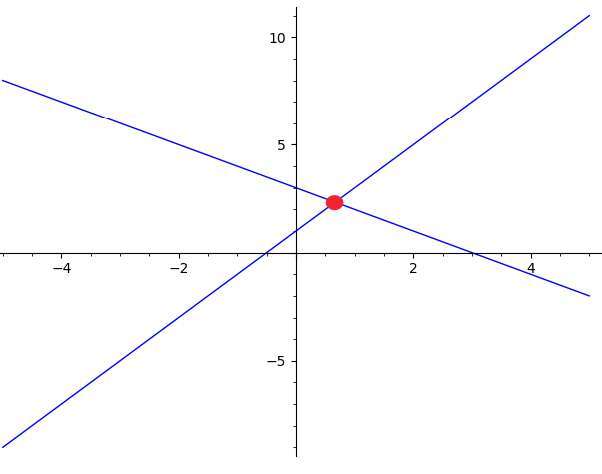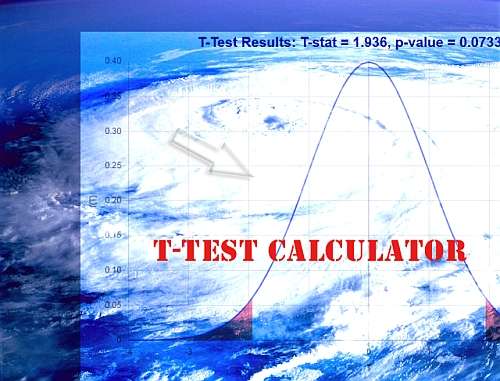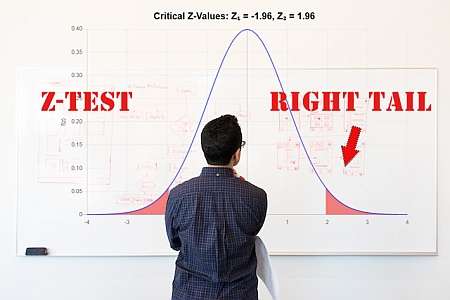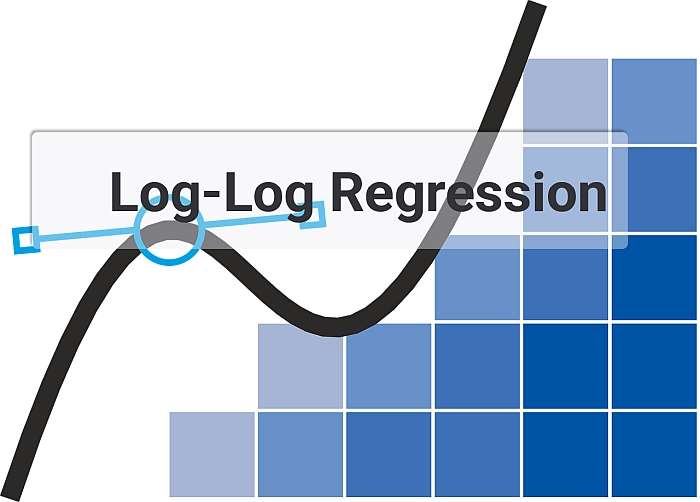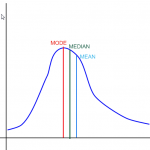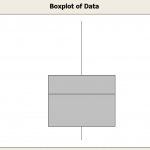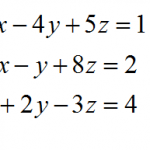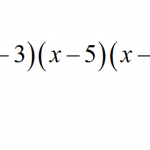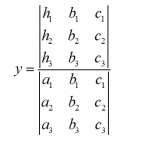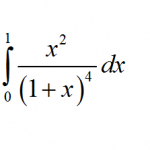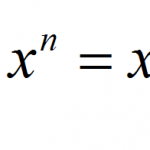MATHCRACKER propose une grande variété de calculateurs de statistiques, qui effectueront des calculs pas à pas pour vous.De telles calculatrices viennent sous toutes les formes et formes, certaines sont très simples
(comme par exemple, simple, simple
Combinatoire de coefficient de Calculs de coefficient)
et certains comportent des calculs élaborés
(comme un test statistique non paramétrique).
Un grand avantage de nos calculatrices / solveurs en ligne est que nous essayons de fournir, dans la mesure du possible, un détail complet de la procédure à suivre pour arriver à la solution requise.
Nous croyons que montrer toutes les étapes de la façon dont on est arrivée à la solution est la meilleure façon (et parfois la seule façon) d'apprendre un sujet.
Il existe de nombreuses calculatrices de probabilité (y compris des calculatrices pour les distributions les plus courantes, telles que la normale, la distribution de T, la distribution F, etc.), une
Sélection complète des solveurs de test d'hypothèse, pour des tests paramétriques et non paramétriques.
Comment trouver la calculatrice de statistiques que je recherche?
Consultez notre liste ci-dessous sur STATS Solvers ou vous pouvez également utiliser la zone de recherche fournie pour trouver la calculatrice exacte que vous recherchez.Chaque solveur viendra avec des instructions claires sur la manière dont le solveur doit être utilisé.De plus, certaines calculatrices auront des vidéos disponibles qui vous aideront à procéder si vous avez des problèmes.
Notre objectif est d'avoir la collection la plus complète de calculatrices de mathématiques en ligne, et quand je dis que je veux dire que nous n'avons pas que des calculatrices de statistiques, mais aussi une algèbre, une probabilité et de nombreux autres sujets.S'il y a un solveur que vous ne trouvez pas sur notre site et que vous souhaitez voir inclus ici, n'hésitez pas à
NOUS CONTTATEUR
.
Vérifiez les calculatrices STATS que nous avons disponibles
Instructions: This Negative Predictive Value Calculator computes the negative predictive value (NPV) of a test, ...
Instructions: This Positive Predictive Value Calculator computes the positive predictive value (PPV) of a test, ...
Instructions: This Specificity Calculator computes the specificity of a test, showing step-by-step all calculation. To ...
Instructions: This Sensitivity Calculator computes the sensitivity of a test, showing all the steps. To that end, ...
Instructions: Use this Covariance Calculator to find the covariance coefficient between two variables (X) and (Y) that ...
Instructions: This Deviation Score Calculator will compute the deviation with respect to the mean for a sample of data ...
Instructions: Use this one to calculate the percentile from the mean and standard deviation. Please provide the ...
Instructions: This Degrees of Freedom Calculator will calculate the number of degrees of freedom for paired samples of ...
Instructions: This Degrees of Freedom Calculator will indicate the number of degrees of freedom for two samples of, ...
Instructions: This Degrees of Freedom Calculator will indicate the number of degrees of freedom for one sample of, ...
Instructions: This interquartile range calculator will calculate the IQR, showing step-by-step calculations, for a ...
Instructions: This decile calculator will calculate a decile that you specify, showing step-by-step calculations of ...
Instructions: This quartile calculator will calculate a quartile you specify, showing step-by-step calculations, for a ...
Instructions: You can use this Pooled Proportion Calculator to compute the pooled proportion for two sample. ...
Instructions: Use this Weighted Average Calculator to compute the weighted average of a set of values (X) and their ...
Instructions: Use this Ogive Graph Maker to construct a cumulative frequency polygon based on a sample provided in the ...
Instructions: Use this Frequency Polygon Graph Maker to construct a frequency polygon based on a sample provided in ...
Instructions: Use this Sample Variance of Grouped Data Calculator to find the sample variance for the case of grouped ...
Instructions: Use this Sample Mean of Grouped Data Calculator to find the sample mean when you have grouped data, in ...
Instructions: Use this Coefficient of Determination Calculator to compute the coefficient of determination ((R^2)) ...
Instructions: Use this Residual Plot Grapher to construct a residual plot for the value obtained with a linear ...
Instructions: Use this Regression Predicted Values Calculator to find the predicted values by a linear regression ...
Instructions: Use this Regression Residuals Calculator to find the residuals of a linear regression analysis for the ...
Instructions: The following Pie Chart Maker for raw data creates a pie chart based on sample data you provide in the ...
Instructions: Use this sample min calculator to get the minimum value (the smallest value) from all the values in a ...
Instructions: Use this Relative Frequency Graph Maker to create a bar chart with relative frequencies associated to ...
Instructions: Use Markov's Inequality calculator to estimate an upper bound of the probability of an event (Pr(X ge)) ...
Instructions: Use this Frequency Table Calculator to construct a frequency table associated with the sample provided ...
Instructions: Use this Summation Calculator to get the sum of all the values from a sample provided in the form below. ...
Instructions: Use this Standard Normal Distribution Probability Calculator to compute probabilities for the Z ...
Instructions: Use this step-by-step Bayes Rule Calculator to reverse conditional probabilities using Bayes' Theorem. ...
Instructions: This Contingency Table Calculator will help you create a contingency table (also known as crosstable) ...
Instructions: Use this Spearman's Critical Correlation Calculator to find the critical values for Spearman's ...
Instructions: Use this Multinomial Coefficient Calculator to compute showing all the steps a multinomial coefficient ...
Instructions: Use this Multiple Correlation Coefficient Calculator for a multiple linear regression. Please input the ...
Instructions: Use this step-by-step calculator for a confidence interval for the difference between two Means, for ...
Instructions: Use this step-by-step Confidence Interval for Mean Calculator, with unknown population variance, by ...
Instructions: Use this step-by-step Confidence Interval for Mean Calculator, with known population variance, by ...
Instructions: Use this step-by-step calculator for a confidence interval for the difference between two Means, for ...
Instructions: Use this step-by-step Confidence Interval for the Difference Between Proportions Calculator, by ...
Instructions: Use this step-by-step Confidence Interval for Ratio of two Variances Calculator ((displaystyle frac ...
Instructions: Use this step-by-step Confidence Interval for Proportion Calculator, by providing the sample data in the ...
Instructions: Use this step-by-step Confidence Interval for Variance and Standard Deviation Calculator, by providing ...
Instructions: Use this Sample Variance Calculator to compute, showing all the steps the sample variance (s^2), using ...
Instructions: Use this Z-score to T-score Calculator to transform a z-score into a T-score (this is capital "T"). ...
Instructions: Use this residual sum of squares to compute (SS_E), the sum of squared deviations of predicted values ...
Instructions: Use this regression sum of squares calculator to compute (SS_R), the sum of squared deviations of ...
Instructions: Use this Raw Score Calculator to transform a z-score into a raw score. Please provide the information ...
Instructions: This Sum of Squares Calculator will help you compute the sum of squares associated to a set of sample ...
Instructions: This Percentile to Z-score Calculator will compute the z-score associated to a given percentile that is ...
Instructions: This Z-Score to Percentile Calculator will compute the percentile associated to a Z-score that is ...
Instructions: Use this Law of Multiplication calculator to compute the probability (Pr(A cap B)). Please provide the ...
Instructions: Use this Law of Addition calculator to compute the probability (Pr(A cup B)). Please provide the ...
Instructions: Use this Conditional Probability calculator to compute the conditional probability (Pr(A | B)). Please ...
Instructions: Use this step-by-step Total Probability Rules calculator to compute the probability of an event (A), ...
Instructions: This calculator allows you to use the Maximax criterion (also known as optimistic criterion) to make a ...
Instructions: Use this prediction interval calculator for the mean response of a regression prediction. Please input ...
Instructions: Use this confidence interval calculator for the mean response of a regression prediction. Please input ...
Instructions: Enter the sample data below and this calculator will provide step-by-step calculation of the Five Number ...
Instructions: Use this calculator to compute Chi-Square distribution probabilities. Please type in the number of ...
Instructions: Use this calculator to compute F-distribution probabilities. Please type in the degrees of freedom ) ...
Instructions: Enter the sample data below and this calculator will provide step-by-step calculation of the Mean ...
Instructions: Use this calculator to compute the adjusted R-Squared coefficient from the R-squared coefficient. Please ...
Instructions: Use this calculator to compute the adjusted R-Squared coefficient for a multiple linear regression. ...
Instructions: Use this calculator to compute the adjusted R-Squared coefficient for a simple linear regression. Please ...
Instructions: Use this calculator to estimate the effect of a finite population on the calculation of the standard ...
Instructions: Use this calculator to compute probabilities associated to the sampling distribution of the sample ...
Instructions: Use this McNemar test calculator calculator to compute the results of applying McNemar's procedure to ...
Instructions: Enter the sample data below and this calculator will provide step-by-step calculation of the Mean ...
Instructions: Enter the sample data below and the solver will provide step-by-step calculation of the Mid-Range, using ...
Instructions: You can use step-by-step calculator to get the mean ((mu)) and standard deviation ((sigma)) associated ...
Instructions: You can use this Multiple Linear Regression Calculator to estimate a linear model by providing the ...
Instructions: You can use this Multiple Linear Regression Calculator to estimate a linear model by providing the ...
Instructions: You can use this Probability to Odds Calculator to compute the odds for the occurrence of an event, ...
Instructions: You can use this Odds to Probability Calculator to compute the probability of an event ((p)), given the ...
Instructions: Use this Hypergeometric Probability Calculator to compute hypergeometric probabilities using the form ...
Instructions: This tool will show you step-by-step calculations of the semi-partial correlations for three variables ...
Instructions: You can use this Partial Correlation Calculator to compute the corresponding partial Correlations for ...
Instructions: In order to use this Coefficient of Variation Calculator, please provide the sample data below and this ...
Instructions: Use this Correlation Coefficient Significance Calculator to enter the sample correlation (r), sample ...
Instructions: This correlation matrix calculator will provide you with a correlation matrix for a given set of. ...
Instructions: Use this outlier calculator by entering your sample data. This calculator will show you all the steps to ...
Instructions: Use this Normal Probability Plot maker by entering the sample data below and this statistics calculator ...
Instructions: Compute the inverse cumulative score for the standard normal probability distribution. Provide a ...
Instructions: This statistical power calculator computes, showing all the steps, the minimum required sample size ()) ...
Instructions: This power calculator computes, showing all the steps, the probability of making a type II error ()) ...
Instructions: This percentile calculator for grouped data will calculate a percentile you specify, showing step-by, ...
Instructions: This percentile calculator will calculate a percentile you specify, showing step-by-step, for a sample ...
Instructions: This effect size calculator for the t-statistic allows you to compute the value of (r^2) (r-squared) if ...
Instructions: This Chebyshev's Rule calculator will show you how to use Chebyshev's Inequality to estimate ...
Instructions: This Empirical Rule calculator will show you how to use the Empirical Rule to compute some normal ...
Instructions: You can use this permutation coefficient calculator to compute (P_{n,k}), for two given integers (n)( ...
Instructions: You can use this combinatorial coefficient calculator to compute "n choose k", or ( C_{n,k}), for two ...
Instructions: You can use this factorial calculator to compute the factorial of an integer number (n). Type the: ...
Instructions: You can use this Spearman Correlation Calculator tool to compute Spearman's Correlation Coefficient for ...
Instructions: This calculator computes the pooled variance and standard deviation for two given sample standard ...
Instructions: This Effect Size Calculator will compute the value of Cohen's d for you, showing all the steps. Please ...
Instructions: This Gamma Coefficient Calculator computes the value of Gamma, which measures the strength of the ...
Instructions: This calculator conducts a Sign Test. Please select the null and alternative hypotheses, enter the ...
Instructions: The following graphical tool creates a bar graph based on the data you provide in the boxes below. All ...
Instructions: Use this Harmonic Mean Calculator by entering the sample data below and the solver will provide step-by ...
Instructions:The following graphical tool creates a Stem-and-Leaf on the data you provide in the box below. Type the ...
Instructions: This calculator conducts a t-test for one population mean ((sigma)), with unknown population standard ...
Instructions: This calculator conducts a Chi-Square test of independence. Please first indicate the number of columns ...
Instructions: Use this Mean and Standard Deviation Calculator by entering the sample data below and the solver will ...
Instructions: This calculator conducts a t-test for two paired samples. This test applies when you have two samples ...
Instructions: Use this Confidence Interval Calculator for the population mean (mu), in the case that the population ...
Instructions: This calculator finds the minimum sample size required to estimate a population proportion ((p)) within ...
Instructions: This calculator conducts a Wilcoxon Rank Sum test for two independent samples. This test applies when ...
Instructions: Enter the sample correlation (r), sample size (n) and the significance level (alpha), and the solver ...
Instructions: This calculator conducts One-Way ANOVA for a group of samples, with the purpose of comparing the ...
Instructions: This calculator conducts a Wilcoxon Signed-Ranks Test for two paired samples. This test applies when you ...
Instructions: This calculator computes the value of Cramer's V. Please first indicate the number of columns and rows ...
Instructions: You can use this Phi Coefficient calculator by first indicating the number of columns and rows for the ...
Instructions: The following graphical tool creates a box plot on the data you provide in the boxes. You can type one ...
Instructions: This calculator conducts Kruskal-Wallis Test, which is non-parametric alternative to the One-Way ANOVA ...
Instructions: Use this T-Distribution Probability Calculator to Compute t-distribution probabilities using the form ...
Instructions: Compute critical Chi-Square values for the Chi-Square distribution using the form below. Please type the ...
Instructions: This calculator computes the value of Lambda, which measures the strength of the association between two ...
Instructions: Use this Time Series Plot Maker to create a time series plot using the form below. All you have to do is ...
Instructions: This calculator conducts a Z-test for one population mean ((mu)), with known population standard ...
Instructions: Use this Descriptive Statistics Calculator to enter the sample data below and the solver will provide ...
Instructions: Compute Poisson distribution probabilities using the form below. Please type the population mean (; ...
Instructions: This calculator conducts a Z-test for one population proportion (p). Please select the null and ...
Instructions: Compute exponential distribution probabilities using the form below. Please type the population mean ( ...
Instructions: This calculator computes the Relative Risk for a 2x2 crosstabulation, which measures the ratio of the ...
Instructions: Use our Binomial Probability Calculator to compute binomial probabilities using the form below. Please ...
Instructions: The following graphical tool creates a histogram based on the data you provide in the boxes below. All ...
Instructions: Compute critical t values for the t-distribution using the form below. Please type significance level ...
Instructions: The following graphical tool creates a box plot on the data you provide in the boxes. You can type one ...
Instructions: This calculator conducts Kruskal-Wallis Test, which is non-parametric alternative to the One-Way ANOVA ...
Instructions: Use this T-Distribution Probability Calculator to Compute t-distribution probabilities using the form ...
Instructions: Enter the sample correlation (r), sample size (n) and the significance level (alpha), and the solver ...
Instructions: This calculator conducts One-Way ANOVA for a group of samples, with the purpose of comparing the ...
Instructions: This calculator conducts a Wilcoxon Signed-Ranks Test for two paired samples. This test applies when you ...
Instructions: This calculator computes the value of Cramer's V. Please first indicate the number of columns and rows ...
Instructions: You can use this Phi Coefficient calculator by first indicating the number of columns and rows for the ...
Instructions: Compute critical z-values for the normal distribution probabilities using the form below. In order to do ...
Instructions: Use our Binomial Probability Calculator to compute binomial probabilities using the form below. Please ...
Instructions: The following graphical tool creates a histogram based on the data you provide in the boxes below. All ...
Instructions: Compute critical t values for the t-distribution using the form below. Please type significance level ...
Instructions: The following graphical tool creates a box plot on the data you provide in the boxes. You can type one ...
Instructions: This calculator conducts Kruskal-Wallis Test, which is non-parametric alternative to the One-Way ANOVA ...
Instructions: Use this T-Distribution Probability Calculator to Compute t-distribution probabilities using the form ...
Calculateur d'intervalle de confiance du coefficient de corrélation
Instructions:
Vous pouvez utiliser ce calculateur d'intervalle de confiance pour le coefficient de corrélation dans le cas où vous connaissez déjà la corrélation de l'échantillon. Ainsi, tout ce que vous avez à faire est de fournir la corrélation d'échantillon \(r\), la taille d'échantillon \(n\) et de spécifier le niveau de confiance dans le formulaire ci-dessous.
Instructions:
Utilisez cette calculatrice pour générer une matrice de ligne élémentaire qui multipliera la ligne \(p\) par un facteur \(a\), et la ligne \(q\) par un facteur \(b\), et les ajoutera, en stockant le résultats dans la ligne \(q\). Veuillez fournir les informations requises pour générer la matrice de ligne élémentaire.
La notation que vous suivez est \(a R_p + b R_q \rightarrow R_q \)
Instructions:
Utilisez cette calculatrice Matrix Determinant pour calculer le déterminant donné d'une matrice, en montrant toutes les étapes. Tout d'abord, cliquez sur l'un des boutons ci-dessous pour modifier la dimension de la matrice, si nécessaire.
Ensuite, cliquez sur la première cellule et tapez la valeur, et déplacez-vous dans la matrice en appuyant sur "TAB" ou en cliquant sur les cellules correspondantes, pour définir TOUTES les valeurs de la matrice.
Instructions:
Utilisez cet outil graphique pour tracer le graphique de deux lignes que vous fournissez. Veuillez saisir deux équations linéaires.
Instructions:
Utilisez cette calculatrice pour résoudre un système de deux équations linéaires en utilisant la méthode de substitution, montrant toutes les étapes. Veuillez saisir deux équations linéaires valides dans les cases ci-dessous :
Instructions:
Utilisez cette calculatrice pour résoudre un système d'équations linéaires en utilisant la méthode d'élimination, avec toutes les étapes indiquées . Veuillez fournir deux équations linéaires valides dans les cases ci-dessous :
Instructions:
Utilisez cette calculatrice pour résoudre un système de deux équations linéaires en utilisant la méthode graphique. Veuillez saisir deux équations linéaires valides dans les cases ci-dessous :
Instructions :
Utilisez cette calculatrice pour travailler sur un test t à deux échantillons, en montrant toutes les étapes. Pour effectuer le test, vous devez fournir deux échantillons indépendants dans la feuille de calcul ci-dessous. Vous pouvez taper les données ou simplement les coller à partir d'Excel.
Instructions :
Utilisez cette calculatrice de test z à deux échantillons pour obtenir les résultats d'un test t lorsque deux échantillons sont fournis, ainsi que les écarts types correspondants de la population. Veuillez fournir les informations requises ci-dessous
Instructions :
Utilisez cette calculatrice pour calculer la proportion de l'échantillon, en fonction d'un nombre de cas favorables et d'un nombre total de cas. Veuillez saisir les informations requises dans les formulaires ci-dessous :
Instructions :
Utilisez cette calculatrice de fractions pour calculer n'importe quelle opération ou calcul de fraction que vous fournissez, en affichant toutes les étapes. Veuillez saisir l'expression que vous souhaitez effectuer dans la zone de formulaire ci-dessous.
Instructions :
Utilisez cette calculatrice pour estimer un modèle de régression log-log, montrant toutes les étapes. Veuillez saisir ou coller les données des variables X et Y dans la feuille de calcul ci-dessous :
Instructions :
Utilisez cette calculatrice pour calculer l'élasticité-prix des données d'échantillon dont vous disposez sur le prix et la quantité demandée pour un bien. Veuillez saisir ou coller vos données dans la feuille de calcul ci-dessous.
Instructions :
Utilisez le calculateur d'élasticité pour utiliser la formule d'élasticité de l'arc en fonction de deux prix et des quantités demandées correspondantes. Veuillez fournir les informations requises dans les cases ci-dessous.
Instructions :
Utilisez cette calculatrice pour calculer la formule d'élasticité de l'arc pour un tableau de valeurs avec le prix (P) et la quantité demandée (Q). Veuillez saisir ou coller vos données dans la feuille de calcul ci-dessous.
Instructions :
Utilisez ce calcul d'élasticité à partir de la demande pour calculer votre offre, en affichant toutes les étapes. Veuillez saisir l'expression que vous souhaitez effectuer dans le formulaire ci-dessous.
Si vous avez des suggestions, ou si vous souhaitez signaler un solveur / calculateur défectueux, n'hésitez pas à
nous contacter
.

























































































